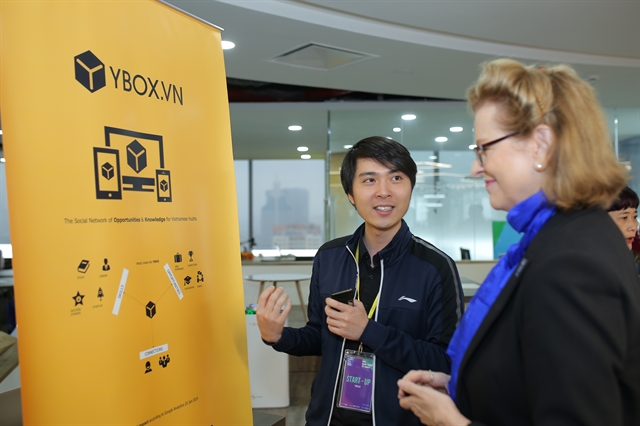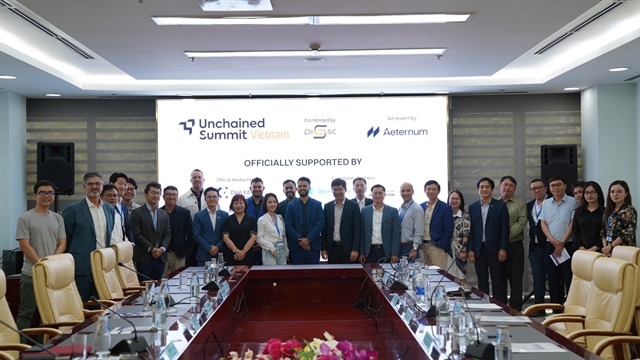 Society
Society

Since its debut in 2013, Ybox has developed from a Facebook fanpage sharing opportunities for university students to a website offering wide ranges of jobs, scholarships, competitions and application tips.

|
| Đặng Hồng Thái (left) presented the model of Ybox to Caitlin Wiesen, United Nations Development Programme (UNDP) resident representative in Việt Nam. — Photo courtesy of CSIP |
Khoa Thư
HÀ NỘI — Any time Lê Thanh Tùng feels an urge to swap jobs, he finds himself scrolling through ybox.vn.
“The website offers a well curated collection of job opportunities and scholarships for Vietnamese youth,” said the 24-year-old alumnus of Hà Nội’s prestigious Foreign Trade University (FTU).
Tùng has used Ybox since 2015 after noticing his friends searching for extracurricular activities on the website.
“I have successfully applied for two positions, one at a renowned economic research institute and the other at an international organistion, thanks to Ybox,” said Tùng.
Since its debut in 2013, Ybox has developed from a Facebook fanpage sharing opportunities for university students to a website offering wide ranges of jobs, scholarships, competitions and application tips.
It has approached more than 12 million young Vietnamese people and helped to provide occupational orientations for some 500,000 users per months.
“Rich content and a friendly interface are the most significant features of Ybox,” said Minh Hằng, a user since 2015.
“We can even create online CVs and write our own articles on skills-building and personal development, too. It feels like the developers are trying to turn Ybox from an opportunity-sharing website into a career-oriented platform for Vietnamese youth,” she said.
Standing behind Ybox is 30-year-old Đặng Hồng Thái, another alumnus of FTU, who was named on Việt Nam’s list of 2019 Forbes 30 under 30.
The idea of starting Ybox came to Thái quite late in 2014, a year after he launched the Facebook fanpage and started gaining a reputation for providing considerable educational and employment opportunities.
The first investment was VNĐ100 million (US$4,300), Thái said, and the company started earning a revenue in 2015.
To attract more attention and promote the website, Thái and his partners won Kawaii Business Start-up – the most popular competition for young entrepreneurs in Việt Nam – the same year.
The award of 400,000 yen ($3,700) and confirmed potential helped Ybox to approach about 1.5 million users at the time.
“Ybox is a business for a social cause,” Thái told Việt Nam News. “From the beginning, it has served only one mission: empowering Vietnamese youth to address unemployment.”
“Ybox is usually considered a social enterprise although it is not registered as one,” he said.
“Providing social services is our way to sustain employment while economic profits always come second. As our growth ultimately depends on youngsters, it would be a disaster if they lose faith in us,” Thái added.
The emerging wave of social entrepreneurship has only started catching attention since 2008 despite the model’s appearance in Việt Nam in the mid-90s.
According to the Centre for Social Initiatives Promotion (CSIP), Việt Nam’s leading NGO in promoting social entrepreneurship, there are some 300 companies registered as social enterprises in the country with KOTO – standing for Know One Teach One – hospitality training centre as one of the vanguards.
KOTO provides dining services for tourists and expats in Việt Nam, while at the same time offers free vocational training for thousands of adolescents from disadvantaged backgrounds.
Starting up with social enterprises has become a popular choice for many Vietnamese youngsters as they can contribute to society while earning profits.
“Việt Nam’s market has the potential for investing which is shown through the quantity and quality of start-up companies, especially in terms of social entrepreneurship,” said Phạm Kiều Oanh, founder and CEO of CSIP.
A report issued by British Council in March 2019 said 21 per cent of Vietnamese social enterprises had exported their products to international markets, especially handcrafted bags, scarfs and decorations.
Over the past 12 years, CSIP and its partners have incubated more than 200 social enterprises, creating jobs for more than 100,000 people and improving the livelihoods of 600,000 from vulnerable groups including women, children, people with disabilities and ethnic minorities.
Since October 2018, the organisation has taken responsibility to coordinate Remake City – an impact accelerating programme which aims to address social issues with the sponsorship of the Korea International Cooperation Agency.
Seven start-up companies including Ybox have been nurtured under the programme’s framework with total investment of $225,000.
“One of the biggest challenges facing Vietnamese social enterprises is the lack of access to financial, human and intelligence resources,” said Oanh.
“Việt Nam does not have a specialised financial mechanism that fits the demands of social enterprises. While investment funds always ask for a high and rapid growth, most social enterprises need venture capital to sustain their activities,” she said.
According to Oanh, at present, it is difficult to define social enterprises in Việt Nam as they pursue both social and economic missions under different business models. The diversity sets a barrier to developing a special assistance policy to support and accelerate the social entrepreneurship movement in the country.
“Against all odds, the development of social entrepreneurship is critical to implementing the Sustainable Development Goals. We believe that if all existing barriers are removed and more favourable conditions are created, social enterprises can make fundamental changes in Việt Nam in the coming years,” said Oanh. — VNS




